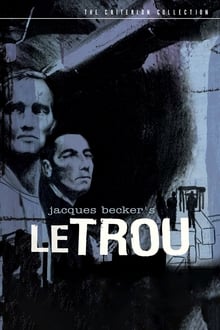
This week's Noir of the Week is Le Trou (1960) directed by Jacques Becker. The film was called The Night Watch when released in the US in 1960.
The 2 ½ hour prison escape film, like Rififi, utilizes long, unbroken, often dialogue-free shots to dramatize the simple story of a group of prisoners attempting an ambitious escape from prison. Le Trou is shot in black and white and is totally without soundtrack music until the very end.
The film begins with one of the escapees, now outside the Santé Prison walls introducing the story. The film then flashes back to the Paris prison in 1947.
We’re then introduced to a young man Claude Gaspard. He’s put into a very small cell with four other inmates. There he meets the charming, always smiling Volsselin, nicknamed Monseigneur. Also in the cell are fellow inmates Roland Darbant, the man who introduced the film, Geo Cassid, and Manu Borelli.
The men work in their cell assembling cardboard boxes. Gaspard finds out that the men in his cell all eat well from care packages from the outside and all are close friends. What he doesn’t realize is that the men are working on escaping. While picking up a care package filled with bread, butter, saugage, smoked fish and rice pudding, the men discuss whether the should tell the new guy about their prison escape plans. They eventually take Gaspard into their confidence and being the long task of breaking the floor.
Slowly, in real time, the men chip away at the concrete floor that leads to a sewer tunnel.
The film lacks most prison film clichés. There are no sadistic prison guards, and all the prisoners seem like regular guys. Director Becker, who died shortly after the film was completed, used unprofessional actors including Jean Keraudy who was an actual participant in the escape attempt in 1947.
Given the film takes place in only three days, the sense of overwhelming tenacity shown by the prisoners is an astounding piece of filmmaking. The film has a number of memorable scenes, including the noisy breaking of the concrete floor with one of the bed legs –in real time- while another prisoner looks out the peep hole using a spy glass made from a tooth brush and a broken piece of mirror. Watching the scene draws you in an even makes you feel like a participant in the hacking, sawing and picking.
I won’t give away the ending or any of the interesting plot twists, but let’s just say there’s a heart-breaking double cross involved in a very un-Hollywood finish. Young Gaspard has to bear the brunt of an ironic plot-twist at the end. The film is a great prison escape film not to be mistaken for the French New Wave happening at the same time.
Written by Steve-O